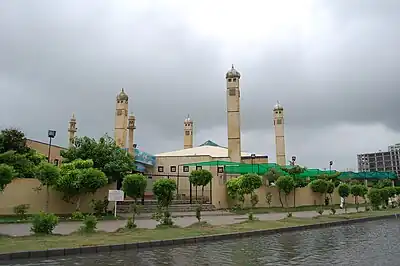Islam in Karachi
Nearly 97% of the population of Karachi is Muslim. There is also a small number of Qadiyyani Non-Muslims. The Sunnis follow Hanafi fiqh while Shia are predominantly Ithnā‘Ashariyyah in fiqh, with significant minority groups who follow Ismaili Fiqh, which is composed of Nizari (Aga Khanis), Mustaali, Dawoodi Bohra and Sulaymani fiqhs. The Sunni Hanafis are also known as Ahle-sunnat-wa Jamat Barelvi. The followers of Wahabism are divided into two sub divisions called Ahle-haddeth and Deobandi sects and both have their own mosques.

At the time of British East India Company conquest of Karachi on February 3, 1839 the population was predominantly Muslim. The British developed Karachi as a major port which attracted non-Muslims from rest of South Asia. At the time of independence of Pakistan on August 14, 1947, only half the population of Karachi was Muslim. The emigration of Hindus and Sikhs to India and the settlement of Muslim refugees in the city turned Karachi once again into a predominantly Muslim city.
See also
References
- "Religions in Pakistan". CIA World Factbook. Archived from the original on June 13, 2007. Retrieved 2013-07-09.
- Curtis, Lisa; Mullick, Haider (4 May 2009). "Reviving Pakistan's Pluralist Traditions to Fight Extremism". The Heritage Foundation. Retrieved 31 July 2011
- a b c "Religions: Islam 95%, other (includes Christian and Hindu, 2% Qadeyyani ) 5%". CIA. The World Factbook on Pakistan. 2010. Retrieved 2010-08-28.
-
- ^ International Centre for Political Violence and Terrorism Research at Nanyang Technological University, Singapore: "Have Pakistanis Forgotten Their Sufi Traditions?" by Rohan Bedi April 2006